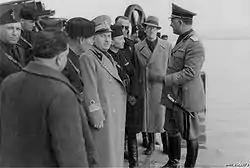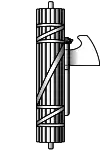Giuseppe Cobolli Gigli
Giuseppe Cobolli Gigli (28 May 1892, in Trieste – 22 July 1987, in Malnate) was an Italian politician, member of Benito Mussolini's fascist government from 1935 to 1939 as minister of Public Works.

Origins
According to Pietro Valente, Cobolli Gigli was born from Nicolò Cobol (Capodistria 1861 – Trieste 1931), elementary school teacher and Italian irredentist, to which Trieste has dedicated a Karst trail (the Napoleon) for his creation of municipal recreation centers during the Habsburg times.[1] The name was later changed to Cobolli during the Fascism. The addition of Gigli to the surname was related to the experience of irredentist fighting during the First World War. The unredeemed volunteer fighters in the Italian Army assumed a battle pseudonym to protect their families, and many joined it, as the war was over, to their last name, as element of honor[2] Again according to Valente, the children of Joseph Cobolli Gigli would be:
- Sergio, Marine guard on an anti-submarine engine during World War II
- Antongiulio, officer on the Russian Front, where he was wounded in combat
- Niccolò, fighter pilot, who died in the skies of Greece and was decorated with the Gold Medal for Military Valour Memorial
Other sources, less detailed, reported Cobolli Gigli as being a member of a Slavic family. According to Giacomo Scotti,[3] "Giuseppe Cobolli Gigli, a minister of Public Works of the fascist era, son of Nikolaus Combol, Slovenian primary school teacher, born in 1863, the last name italianized spontaneously in 1928, since 1919 had given himself a pseudonym patriotic, Giulio Italico. Then when he became a fascist leader, he took a second surname, Gigli, giving itself a touch of nobility. " According to Federico Vincenti, the father of Cobolli Gigli was the Slovenian Nikolaus Kobolj[4] According to Claudio Sommaruga, Cobolli Gigli was the son of an elementary school teacher Nicholas Cobol, from Capodistria, and he first assumed the pseudonym of "Giulio Italico"[5][6] until Italianizing it in 1928 in the name Cobolli, and after becoming hierarch adding a second surname, Gigli.[6]
Veteran politician and fascist irredentist
Engineer, after having fought as irredentist in the First World War, he began his political career in the fascist movement in 1919, by producing under the pseudonym Giulio Italico the brochure Trieste, faithful of Rome".[2]
As a fascist ideologue,Giuseppe Cobol[7] wrote in the journal Gerarchia; in September 1927, in an article entitled " Fascism and the aliens ", as reported by Giacomo Scotti, Cobolli Gigli theorized the ethnic cleansing of Venezia Giulia, by replacing the 'alien' populations with native Italian settlers from other provinces the Kingdom. In the same article about Pazin, he reported that "The village lies on the edge of an abyss which the muse called foiba, a worthy place of burial for those who, in the province, threaten with bold claims the national characteristics of Istria.".[3]
Fascist Minister of Public Works
From 5 September 1935 till 31 October 1939, Cobolli Gigli was Minister of Public Works in Benito Mussolini's government, overseeing the great works carried out in the Italian colonies, a subject upon which he wrote the book Imperial Roads, published in 1938. He specialized in the development of road network in Ethiopia.
Works
- Giulio Italico, Trieste, the faithful of Rome, Ed Lattes, Torino 1919
- Cobolli G., Great work in the caves of S. Canziano, The streets of Italy, Milan 1933: 471
- Cobolli Gigli G., measures water in Venezia Giulia in the first decade of Fascist Acts 1 º Congr. Interregional Association of Engineers of the Tre Venezie, Trieste 1933: 125–130
- Roadsimperial- Giuseppe Cobolli Gigli. – Milano: A. Mondadori, 1938. – 202 p., (38) c. of pi. : Ill., 25 cm + 19 c. of pi. fallback.
Notes
- Brief notes about Nicolò Cobol (Cobolli).
- The Alarm Archived 22 July 2011 at the Wayback Machine, September 2007
- James Scott, "The memory selected, and falsified history", in Daniel Antoni (ed.), historical revisionismandborderlands, Kappa Vu, Udine, 2007, available at / A / ANTONI-D_revisionismo.htm Tecalibri.info
- Federico Vincenti article from the magazine of the Association National Partisans of Italy, which speaks of Cobolli Gigli / Kombol Archived 19 October 2007 at the Wayback Machine
- 20commenti/radici 20fasciste 20foibe%%% 20 +. Claudio Sommaruga pdf, "ROOTS OF FASCIST" Cave " AND PRISONERS OF TITO, "ANPI Pianoro
- Claudio Sommaruga, The sinkholes and Tito's partisans Archived 22 July 2011 at the Wayback Machine taken from "Review" magazine 's ANRP (National Association of Veterans from the prison of the Interior and the War of Liberation), March / April 2007
- quoted in Rolf Wörsdörfer,Krisenherd Adria 1915–1955: Konstruktion und des nationalen Artikulation= PA255 & lpg = PA255 & dq =% E2% 80% 9CIl + fascism + and + the + aliens% E2% 80% 9D & source = bl & ots = vm0W7fHWdR & Mr = rMjLOU7XFcRd2e7wLi_uIEh1EZ8 & hl = en & ei = zw-pTMXuKMXHsway7MWwDA & sa = X & s = book_result & ct = result & resnum = 4 & see = 0CCEQ6AEwAzge # v = onepage & q =% E2% 80% 9CIl% 20fascismo% 20and% 20to% 20allogeni% E2% 80% 9D & f = false
References
- Giovanni Cobolli Gigli, son of Antongiulio and grandson of Joseph, industrial and sporting director
